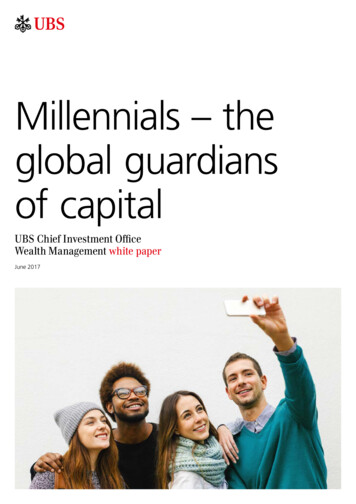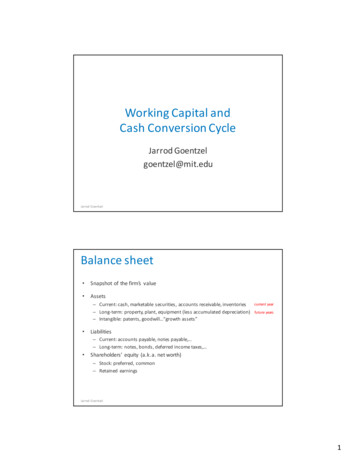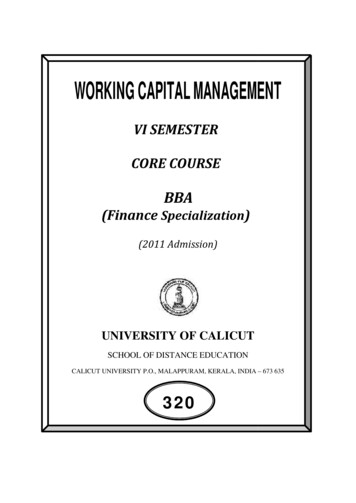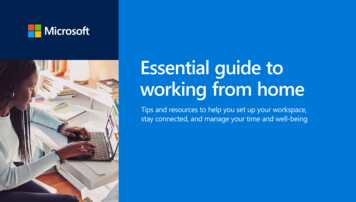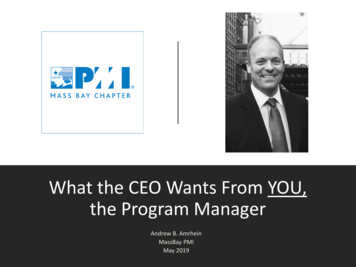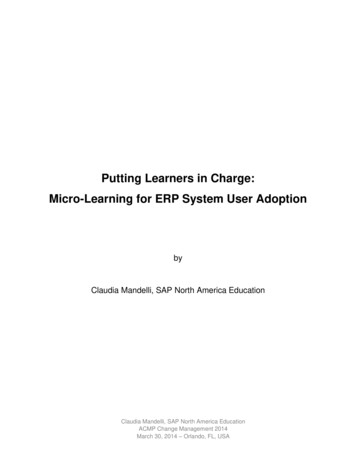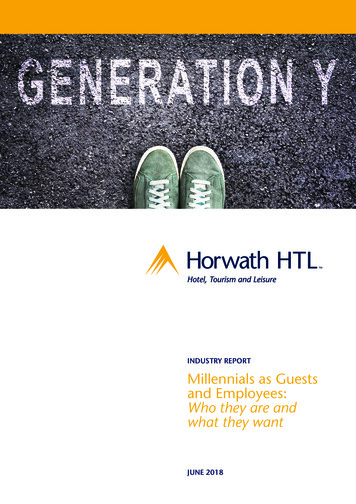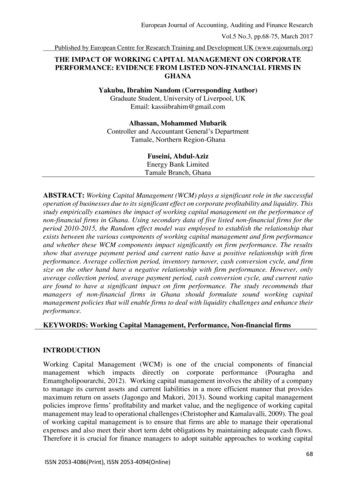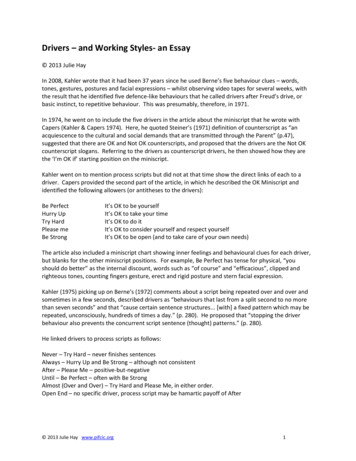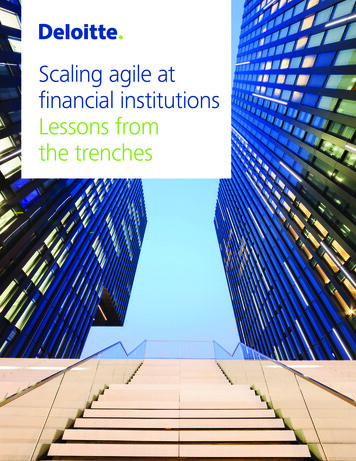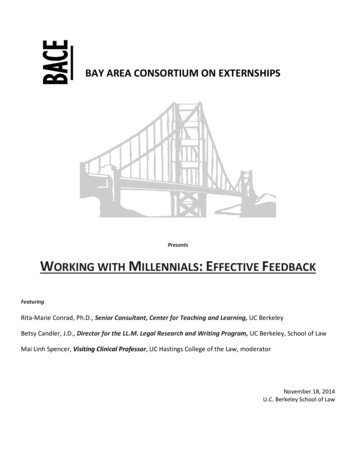
Transcription
BAY AREA CONSORTIUM ON EXTERNSHIPSPresentsWORKING WITH MILLENNIALS: EFFECTIVE FEEDBACKFeaturingRita-Marie Conrad, Ph.D., Senior Consultant, Center for Teaching and Learning, UC BerkeleyBetsy Candler, J.D., Director for the LL.M. Legal Research and Writing Program, UC Berkeley, School of LawMai Linh Spencer, Visiting Clinical Professor, UC Hastings College of the Law, moderatorNovember 18, 2014U.C. Berkeley School of Law
MEMBER SCHOOLS – WEB ADDRESSES AND CONTACT LISTUniversity of California, Berkeley School of LawGolden Gate University School of Lawhttp://www.ggu.edu/externshipclinicsMichele NeitzProfessor of Law and Director of Externship ProgramGolden Gate University School of Law536 Mission StreetSan Francisco, California 94105mneitz@ggu.edu / 415-442-6675JFK University College of e-of-Law/LawClinical-Opportunities.htmlOra ProchovnickProfessor of Law and Director of Clinical and Public Interest LawProgramsJFK University College of Law100 Ellinwood WayPleasant Hill, CA 94523(925) 969-3356 / oprochovnick@jfku.eduSanta Clara University School of Lawhttp://law.scu.edu/apd/externship.cfmSandra “Sandee” MagliozziAssociate Dean for Experiential Learning,Clinical Professor of LawSanta Clara University School of Law500 El Camino RealSanta Clara, CA 95053-0448(408) 554-5015 smagliozzi@scu.eduThiadora PinaAssistant Clinical Professor of LawAssistant Director, Externship Program(408) 551-1609 tpina@scu.eduStanford Law Schoolhttp://www.law.berkeley.edu/179.htmSue SchechterDirector, Field Placement ProgramUC Berkeley School of Law489 Simon HallBerkeley, CA 94620-7200(510) 643-7387 sschechter@law.berkeley.eduUniversity of California, Hastings College of the grams/Externships/index.phpMai Linh SpencerVisiting Clinical ProfessorAcademic Director, Lawyers for AmericaFaculty Supervisor, Legal Externship ProgramUC Hastings College of the Law200 McAllister StreetSan Francisco, CA 94102(415) 565-4743 spencerm@uchastings.eduNancy StuartClinical Professor of LawAssociate Dean for Experiential Learning(415) 565-4620 stuartn@uchastings.eduUniversity of the Pacific, McGeorge School of Lawhttp://www.mcgeorge.edu/x1915.xmlColleen TrudenDirector, Field Placement Program, Lecturer in LawUniversity of the Pacific McGeorge School of Law3200 Fifth AvenueSacramento, CA 95817(916) 340-6104 anford.eduUniversity of San Francisco School of LawJory SteeleDirector of Pro Bono and Externship ProgramsLecturer in LawJohn and Terry Levin Center for Public Service and Public Interest Law559 Nathan Abbott WayStanford, CA 94305-8610(650) 725-7909 jsteele@law.stanford.eduNira GeevargisAssistant Professor and DirectorUniversity of San Francisco School of Law2130 Fulton StreetSan Francisco, CA 94117(415) 422-4467 nageevargis@usfca.eduGOT ps/
BAY AREA CONSORTIUM ON EXTERNSHIPSWorking with Millennials: Effective FeedbackSupervising Attorney Training November 18, 2014ContentsPresenter Bios1Supervising Attorney Characteristics2Providing Feedback to Millennials Powerpoint presentation3BACE forms:Professional Development Plan12Actual Mid-Semester Self-Assessment and Final Evaluations13Feedback Rubric for Written Work23LSAC Successful Lawyering Study25Working with Millennials Bibliography26UC Berkeley Public Service Center Tips and Techniques for Community Partner Supervisors27
BAY AREA CONSORTIUM ON EXTERNSHIPSWorking with Millennials: Effective FeedbackPresenter BiosBetsy Candler is the Director for the LL.M. Legal Research and Writing Program at Berkeley Law School.Her practice focuses on alternative dispute resolutions, including mediation and facilitation. Prior tobecoming a mediator, she worked for over a decade in criminal defense.Rita-Marie Conrad is an online learning strategist and educator, award-winning author and consultant.She is currently assisting the University of California-Berkeley Center for Teaching and Learning insupporting, enhancing and promoting the development of 21st century learning experiences.Mai Linh Spencer , moderator, is the Academic Director of Lawyers for America and also teaches andsupervises students in the Legal Externship program at U.C. Hastings.BACE Working with Millennials page 1
Supervising Attorney CharacteristicsIndicate which of the following describe you. Circle or check all that apply.Open-mindedWant to be respectedWant instantgratificationAmbitiousDon’t take the word “no”as ivic-mindedBelieve in yourselfWant careeradvancementWant great role modelsHate to be boredWant recognition forcontributionsValue work-life balanceDream bigOvertly passionate aboutequalityWant transparency inwork relationshipsOptimistic yet practicalConfidentTeam-orientedAchievement orientedPressured to excelInclusiveTotal:BACE Working with Millennials page 2
BACE Working with Millennials page 3
BACE Working with Millennials page 4
BACE Working with Millennials page 5
BACE Working with Millennials page 6
BACE Working with Millennials page 7
13Chapter 3: Identity, Priorities, andOutlookChapter 3: Identity, Priorities andOutlookLooking at themselves in relation to others, mostMillennials say that theirs is a unique generation.Six-in-ten (61%) say they think of their own agegroup as unique and distinct from othergenerations; 37% do not.Millennials are not alone—other generations alsosee themselves as unique in varying degrees.About half of Gen Xers (49%) see theirgeneration as unique as do 58% of Boomers and66% of SilentsIs Your Generation Unique?% saying that their age group is unique anddistinctAllMillennial (18-29)When asked to name some ways in which theirgeneration is unique and distinct, responses differwidely across age groups. Among MillennialsGen X (30-45)Boomer (46-64)Silent (65 )5761495866who see their generation as unique, technology use is the single most popular response. Roughly a quarter of thoseunder age 30 (24%) say technology is what sets their generation apart. Other ways in which Millennials seethemselves as unique include their music, pop culture and style (11%), and their liberalism and tolerance (7%).Gen Xers also point to technology as a defining characteristic of their generation—but just 12% name this as a wayin which they differ from other generations. In addition, 11% of Gen Xers say their work ethic sets them apart.What Makes Your Generation Unique?1.2.3.4.5.MillennialsGen XBoomersSilentTechnology use (24%)Music/Pop culture (11%)Liberal/Tolerant (7%)Smarter (6%)Clothes (5%)Technology use (12%)Work ethic (11%)Conservative/Trad’l (7%)Smarter (6%)Respectful (5%)Work ethic (17%)Respectful (14%)Values/Morals (8%)“Baby Boomers” (6%)Smarter (5%)WW II, Depression (14%)Smarter (13%)Honest (12%)Values/Morals (10%)Work ethic (10%)Note: Based on respondents who said their generation was unique/distinct. Items represent individual, open-endedresponses. Top five responses are shown for each age group. Sample sizes for sub-groups are as follows: Millennials,n 527; Gen X, n 173; Boomers, n 283; Silent, n o-change/BACE Working with Millennials page 8
18Chapter 3: Identity, Priorities, andOutlookThree-in-ten Millennials say having asuccessful marriage is one of theirmost important life goals. Here theydiffer somewhat from the rest of thepublic; of those ages 30 and older,35% place the highest level ofimportance on having a successfulmarriage. Among Millennials, whitesare more likely than nonwhites toplace a high priority on marriage. Athird of non-Hispanic whites rank asuccessful marriage as one of the mostimportant things in their life,compared with 25% of nonwhites.Roughly a quarter of Millennials(23%) say they are currently married,compared with 59% of Gen Xers and64% of Boomers. In general, youngpeople are less likely to be marriednow than was the case 20 years ago.Beyond marriage and family, 21% ofMillennials say that helping people whoare in need is one of the mostimportant things in their life. Oldergenerations agree—20% of those ages30 and older say helping others is oneof their most important goals. Equallyimportant is owning a home. AmongMillennials, 20% say owning their ownhome is one of the most importantthings to them. Similarly,Life’s Priorities% saying each is one of the most important things intheir lives18-2930 52Being a good parent5030Having a successful marriage3521Helping others in need2020Owning a home2115Living a very religious life15Being successful in a high7paying career9Having lots of free timeBecoming famous21101121% of those ages 30 and older place the highest importance on owning a home.Religion is a lower priority for Millennials. Some 15% say living a very religious life is one of their most importantgoals, and an additional 28% say it is very important but not one of the most important things. About a quarter(26%) say this is not important to them. Older generations are more likely to place a high importance on this—21% of those 30 and older say that living a very religious life is one of the most important things in their life.Millennials place more importance on being successful in a high-paying career than they do on living a religiouslife. Some 15% say being successful in their career is one of the most important things in their life. An nds.org/2010/02/24/millennialsBACE Working with Millennials page 9confident-connected-open-to-change/
19Chapter 3: Identity, Priorities, andOutlook47% say this is very important, though not one of the most important things. Among the older generations, only7% rate a high-paying job as one of the most important things in their life.Having lots of free time to relax and do things they want to do is not a high priority for Americans of any age.Only 9% of adults under age 30 say this is one of the most important things in their life. Among those ages 30and older, 10% place the highest priority on free time.In spite of the fact that they have come of age in the era of YouTube and reality TV, very few Millennials considerbecoming famous an important life goal. A mere 1% say this is one of the most important things in their life, and3% consider it very important but not one of the most important things. The vast majority (86%) say fame is notimportant to them. Older generations feel much the same: Just 1% say achieving fame is one of the most importantthings to them, while 87% say it is not important to them at all.Several of these life goals were included in a 1997 survey conducted by the Washington Post, The Henry J.Kaiser Family Foundation and Harvard University. The findings from that study provide some insight into thegoals of Gen Xers, who are now ages 30-45,when they were younger.10 For the most part,the priorities of Millennials are similar to thoseheld by Gen Xers at a similar stage of life. GenXers placed more value on family relationshipsthan on career goals or religious life.However, Gen Xers viewed parenting as lessimportant and marriage as slightly moreimportant when compared with how Millennialsfeel today. In the 1997 survey, 42% of adultsages 18-29 said being a good parent was one ofthe most important things in their life. Amongtoday’s Millennials, 52% say being a goodparent is one of the most important things tothem. In 1997, adults under age 30 were morelikely than their older counterparts to place agreat deal of importance on having a successfulmarriage. Today, just the opposite is true.10Millennials vs. Gen X When They Were Young% saying each is one of the mostimportant things in their lifeBeing a good parentHaving a successful marriage5242351997 18-29 year-oldsolds (Gen X)302010 18-29 year(Millennial)Source: Data from 1997 are from the Washington Post/Henry J.Kaiser Family Foundation/Harvard University Gender Survey,conducted August 14-27, 1997.The 18-29 year-old age group from 1997 provides a close approximation of Gen X at that -to-change/BACE Working with Millennials page 10
46Chapter 5: Work andEducationThe recession has changed the work experienceof many Millennials. For some, hard times havemeant a part-time job instead of full-timeemployment. For others, the recession has led todelayed entry into the labor market, either byenrolling in school or lingering longer incollege. For still others, it has meant a lengthierwait for a job.Full-time Employment byGeneration, 2006-2010% of each generation employed full time 201041MillennialThe proportion of Millennials employed full timehas fallen from 50% in 2006 to 41% today. Atthe same time, the proportion of this generationwho work part time or are full-time students hasincreased by 3 percentage points to 24% and13%, respectively, and the share of those ages 18to 29 who are not employed increased by 4percentage points to 24%. While2006Change-95065GenX 26354Boomer 153these smaller shifts are not statistically significant, they are roughly similar to the declines that have beendocumented by government employment statistics collected over the past four years.Census statistics also tell another story. About six-in-ten Millennials (63%) are currently employed. That is asignificantly smaller share than the proportion of Gen Xers (70%) or Baby Boomers (66%) who were workingwhen those generations were the same age.Career and Job-Switching among MillennialsPredictably, America’s newest workers are far more likely than older workers to say they are likely to switchcareers or to change employers sometime in theirwork lives.According to the Pew Research Center survey,about two-thirds of all employed Millennials say itis “very likely” (39%) or “somewhat likely” (27%)they will switch careers sometime in theirworking life, compared with 55% of Gen Xersand 31% of Baby Boomers. Remarkably, nearlysix-in-ten employed Millennials say they alreadyhave switched careers at least once, suggestingthat many Millennials are trying out differentcareers or that some respondents equated a jobchange with a career switch.Attitudes toward Job, Career% of each generation who say it is likely theywill M illennialGen XBoomer66Switch careerssometime in theirwork life553142Stay at current job restof working life6284Note: Based on those who are employed full time or part time.PewResearchCenterBACE Working with Millennials page nials-confident-connected-open-to-change/
PROFESSIONAL DEVELOPMENT PLANI.Primary Professional Development GoalsThe items below in BOLD are those activities which, according to my supervisor, I canexpect to accomplish throughout the semester. As for the rest, my supervisor told me that hewill continue to look for opportunities in the office that will allow me to accomplish these goals.II. A.To improve oral argument skills. By observing attorneys argue motions in court, or by observing trials. By discussing oral argument strategy with attorneys; what worked, whatdid not work as well, etc. By practicing at least three oral arguments with supervisors, and obtainingfeedback By arguing at least three motions in court over the course of the semester.B.To improve information-gathering skills. By observing attorneys conduct client and/or witness interviews,counseling, or depositions. By preparing interview outlines for upcominginterviews/counseling/depositions, identifying your goals for the interview andthe topics to be explored; review with supervisor. By conducting at least one interview with a client and/or witness which isobserved by supervising attorney; obtain feedback. By drafting discovery responses and requests.C.To improve negotiation skills. By observing attorneys in mediation/arbitration; debriefing. By discussing mediation strategy with attorneys prior to actual mediation. By identifying general techniques, dos and don’ts, etc. By having mock negotiations with supervisors; obtain feedback. By reading recommended portions of Getting to YesMeasuring ProgressEvery month, I will review my Professional Development Plan with my supervisor in order to:identify which of the above goals / activities I can expect to work on in the upcoming month;identify, based on my performance, which of the above goals / activities I should focus moreattention onBACE Working with Millennials page 12
BACE Working with Millennials page 13
BACE Working with Millennials page 14
BACE Working with Millennials page 15
BACE Working with Millennials page 16
BACE Working with Millennials page 17
BACE Working with Millennials page 18
BACE Working with Millennials page 19
BACE Working with Millennials page 20
BACE Working with Millennials page 21
BACE Working with Millennials page 22
Feedback Rubric for Written WorkProfessionalism:Extern understood assignment, asking clarifying questions up front?Extern worked independently, but communicated about progressand sought guidance when necessary?Extern managed her/his time effectively and worked efficiently?Deadline was met? yes not yet yes not yet yes not yet yes noOverall Legal Analysis:Defines legal issue precisely and accurately? yes not yetStates a clear and precise prediction, rather than waffling (objective)Or states position clearly and persuasively (advocacy)? yes not yetStates general rule and briefly defines the tests? yes not yetIncludes general concepts related to the relevant law (e.g., policyand/or principles underlying legal rule) yes not yetUse of Facts:Uses key facts to frame the legal issue? yes not yetPresents facts in a readable format and is not disjointed? yes not yetPresents (only) relevant facts? yes not yetComments:Overall Presentation:See these pages for examples ofwhere presentation was “not yet”polishedMemo is clear and concise? yesMemo effectively quotes?(i.e., quotes selectively to highlight key facts/reasoning)Writing is fluid and readable?(i.e., includes transitions; sentences are not overlylong; phrasing is direct, rather than awkward)Writing is free of “legalese” or unnecessary wordiness?Cites are correctly formatted and include precise pincites?Memo is properly formatted? yesWriting is free of grammatical errors?Issue #1: yes yes yes yes yesBACE Working with Millennials page 23
Follows a logical structure? yes not yetIncludes a substantively correct and complete rule? yes not yetCase descriptions include useful facts and reasoning?(i.e., case descriptions are not skimpy; and are notcluttered with unnecessary details) yes not yetCase descriptions begin with descriptive topic sentences? yes not yetApplication is explicitly organized around legal concepts? yes not yetApplication includes specific, explicit and relevant comparisons ofour facts and case facts? yes not yetComments/Examples:Issue #2:Follows a logical structure? yes not yetIncludes a substantively correct and complete rule? yes not yetCase descriptions include useful facts and reasoning?(i.e., case descriptions are not skimpy; and are notcluttered with unnecessary details) yes not yetCase descriptions begin with descriptive topic sentences? yes not yetApplication is explicitly organized around legal concepts? yes not yetApplication includes specific, explicit and relevant comparisons ofour facts and case facts? yes not yetComments/Examples:BACE Working with Millennials page 24
LSAC Successful Lawyering StudyShultz and Zedeck (2008)Intellectual & Cognitive Analysis and Reasoning Creativity and Innovation Problem Solving Practical JudgmentConflict Resolution Negotiation Skills Able to See the World Through the Eyesof OthersResearch & Information Gathering
2130 Fulton Street San Francisco, CA 94117 (415) 422-4467 . nageevargis@usfca.edu. BAY AREA CONSORTIUM ON EXTERNSHIPS . Working with Millennials: Effective Feedback Supervising Attorney Training November 18, 2014 . Contents . Pres
